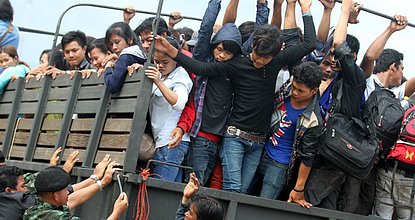
Thai business operators are alarmed by the flight of migrant workers, fearing the labour shortages that inevitably ensue would nip the fledgling economic recovery in the bud.
Thamrong Punyasakulwong, the honorary president of the Thai Condominium Association, said on Monday 80% of the workers in the property sector were migrants, mainly from Myanmar and Cambodia.
President Prasert Taedullayasatit added labour shortages would delay project launches and housing deliveries.
He estimated there were 300,000 migrant workers in Bangkok alone.
He noted foreign workers had a major role in the property sector, as well as in the planned 3-trillion-baht infrastructure projects.
Both urged the junta to set a clear foreign labour policy, both on deportation and registration, so developers can follow.
The property developer AP (Thailand) Plc, which plans to launch at least eight projects worth 7.86 billion baht in the latter half, said today the company was alarmed by possible labour shortages triggered by the exodus of Cambodian workers.
"We're evaluating the situation to determine whether we need to revise our expansion plans," said chief marketing officer Vittakarn Chantavimol.
"But so far, we're on course to meet the target. The impact [of labour shortages] might result in delays in project launches and revenue realisation. We should be able to wrap things up this week," he said.
As well, former finance minister Thirachai Phuvanatnaranubala warned today of the need to quickly attract fleeing Cambodian migrant workers back to Thailand, warning that the economy could be severely affected.
He wrote on his Facebook the flight of tens of thousands of Cambodian workers might deal a knockout blow to the Thai economy.
Many construction projects could be paralysed for lack of labourers. Much building was already behind schedule and some of the constructiion companies now had cash flow problems. They could default on repaying bank loans and interest.
This could lead to the banks being unable to extend loans to new creditors. The problem would spread to other businesses and affect overall employment, household debt and the people's ability to pay instalments due on cars, motorcycles and household appliances.
"All this is because the economic condition of the property sector is already fragile. Many are still suffering from a burden incurred by land speculation along designated high-speed train routes and elsewhere.
"Therefore, negotiations must begin to bring back these Cambodian workers as soon possible," Mr Thirachai said.
In Aranyaprathet, Sa Kaeo province, farmers, vendors and small operators in Aranyaprathet are beginning to feel the pinch of a labour crunch while Cambodian traders along the border here fear for the future if the exodus continues at this rate.
Since early this month, Cambodian workers in Thailand, both legal and illegal, are returning home in droves for fear the junta will crack down on them.
Many of those who stay remain in hiding and do not show up for work.
The number of the migrants crossing the border here to Poipet, Cambodia, shot up to 47,000 on Saturday alone, bringing the total this month to date to 110,000.
With unemployment rates below 1% for several years, Thailand has been relying on migrants from neighbouring countries to support its economic growth, especially in labour-intensive sectors.
Boonmee, a Thai farmer in Sa Kaeo who hires several Cambodians, said her employees had gone into hiding in the woods and farms nearby for one week, forcing her to stop farming.
Her neighbours are also facing the same problem, said Mrs Boonmee, who declined to reveal her family name.
If the rumours are still spreading and Cambodians do not return, the farm sector and small and medium-sized businesses would be hard hit.
Thais no longer take up manual-labour jobs and few who do ask for several times the pay the Cambodians receive.